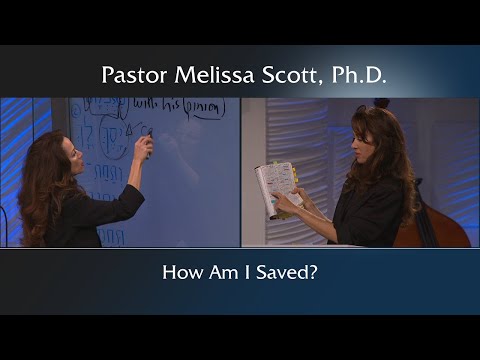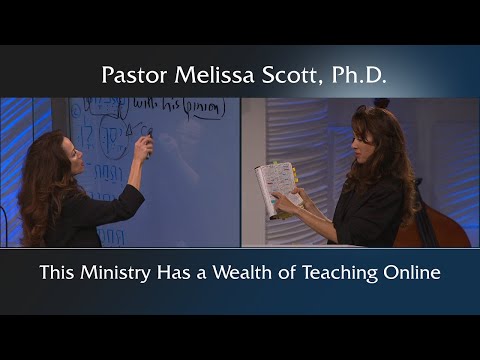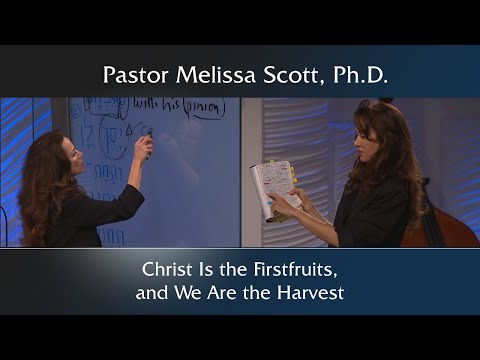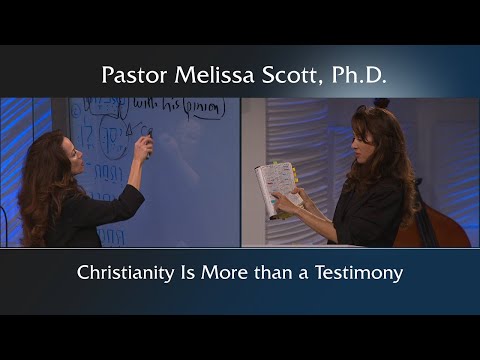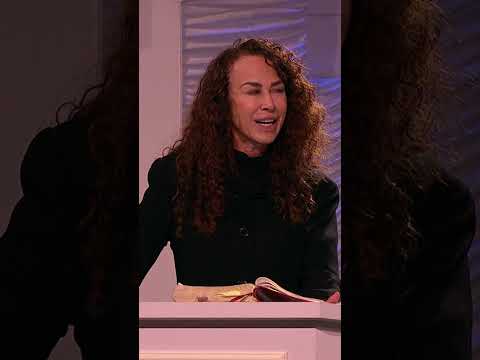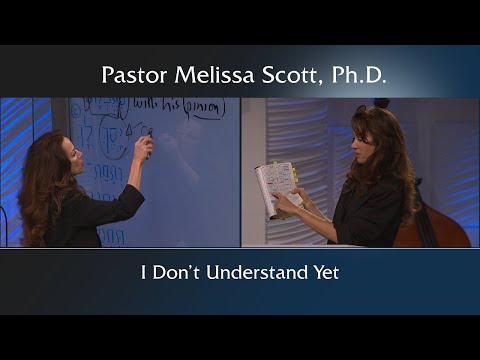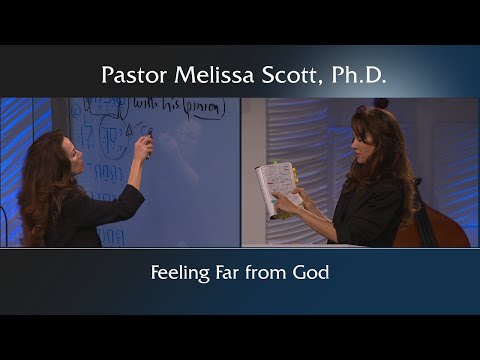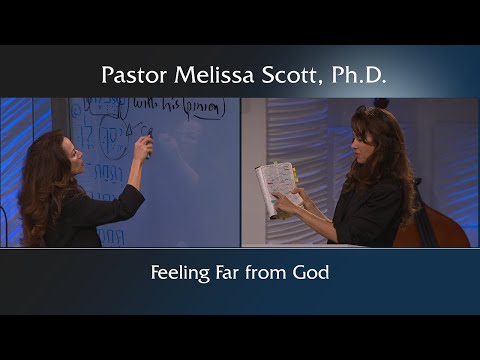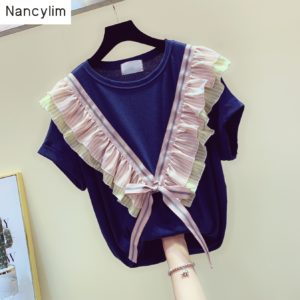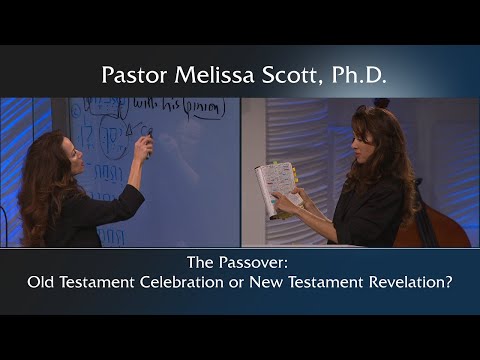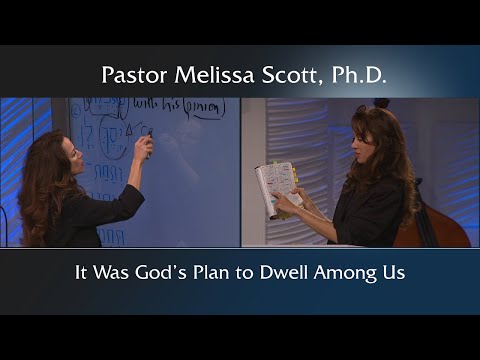Don't say you are a Christian. Don't parse words with me. Don't play games with me. You are a Christian when you are following Christ, period. You're not a Christian because you come to church one day out of the year. You're following Christ. And following Christ doesn't necessarily mean you come to church either. How's that for putting it the way it is? But you're following Christ, which means you are studying Him. And “Him” is not a pronoun limited to one book or one half of a book. It's the whole thing. ♪ ♪ So, we've been in a study now, I think 17-plus weeks, looking at through the lens by way of the New Testament, looking into the Old Testament.
We started with looking at the tabernacle, its furnishings, we moved on to the offerings, and now we are kind of in the set times. And it all ties together, but I've been trying to say this over and over and over again. And maybe you'll hear me repeat it a few times, even in this message today. You've got repeatedly things that are; they are types of our Lord. They are pictures. They are things that when we read them, let's just put ourselves in the Old Testament saints' shoes for a minute and there is no New Testament, just for a second, we would only be seeing one dimension, what God said to Moses, “These are the directions.” That's all we would see, all we would know; we wouldn't know that there's more.
So not just the practical application, but we, reading the full book can see the prophetical application and fulfillment in many of these things, pointing to Christ. Now if I sound repetitive on this, it's because this is what this book does. A lot of people say, “Well, I don't, I don't bother with the Old Testament because it's the Old Testament.” That is the dumbest thing I've ever heard. I'm sorry, but that is. Without this Old Testament, even reading the New Testament doesn't really make sense. You know, if you're reading “Jesus, born of a virgin,” ah, okay, but if, if you're reading the Old Testament and you can see that there were prophecies foretold that our Lord would be born of a virgin, that certain things foretelling, that's why you need the Old Testament. You can't do away with it, and why would you? It's only those people who really don't understand why it's here or they are adherence to the old way.
They are still slaying saber-toothed tigers, even though the saber-toothed tiger doesn't exist anymore. So we, we've been looking at, we started with the Sabbath, Passover, the Feast of Unleavened Bread, marking the beginning of Israel's feasts, commemorating the deliverance of Egypt, out of Egypt's bondage and the first harvest of the year. Now the New Year would later be marked out in the fall season, so we have two New Years to deal with eventually, but I'll explain that in a minute. All of these set times, all of them, first and foremost in their practical setting, were to remind the children of Israel that time, as well as attorney; eternity, as well as everything else, belonged to God. Now, see, sometimes I think these people were really fortunate because, well, they were. They had the direct sight of everything that happened.
We are living generations after and we are having to, by faith, take everything that's here. They got to see firsthand. So if you think about it, if you lived in that day, you might be a little bit better off in some respects, unless you were the stiff-necked, rebellious children of Israel, but you might be better off in that there was some type of connection. I mean, imagine if you were in Egypt's bondage and you saw the plagues poured out and you saw the most powerful ruler in the then-known land basically succumb to the words of God, letting the people go.
I mean, something tells me it'd be a little bit different than how we are in today's day and age, very distracted, it's take it or leave it. We're all in this very, “I'm not sure it really happened, did it happen that way?” And so to really assess why God made these set times, which I've said already, the set times have a connection or a correlation to Israel's history or in general the history, for example, the Sabbath takes you right back to creation. But much of these set times as we begin to study them, we see that God is saying, I want you to remember something in perpetuity, your deliverance out of Egypt's bondage. And why is that important? Because you could read this, just reading the Old Testament here and say, “Okay, I got it already; they, God delivered them out of Egypt's bondage.” But what if Egypt's bondage is God delivering you out of a life basically with no God, full of sin? If that's, then it would be remembered. It would be something you'd keep thinking of and you'd be grateful for that God opened your eyes, that He found you.
That's called prevenient grace. So when God says to remember their deliverance over and over again, yes, He's talking about that specific act, but we who are reading this should remember two things. It's a double; it's a double whammy for us. The first one is that God made good on His word to deliver the people. He said they would go in to a land that was not theirs, they'd be strangers in that land. They'd come out of that land, greater in number, richer, etc., which they did. And then you've got the double whammy for us as Christians, understanding God has called many out of the darkness into His light and that is the same as being delivered from Egypt's bondage. Your, your eyes have been opened.
So don't think, don't just read it in a one-dimensional way. Now on the fifteenth of Nisan, which is the equivalent to our April, depending on when it falls, but usually it's equivalent to April, the Feast of Unleavened Bread began. It went for seven days; no leaven could be consumed. And we read often a term, if you've ever seen━how many of you have ever seen a Passover booklet called a Haggadah? Okay, so it's a little booklet and basically it's, we'll call it the synopsis of the deliverance story, okay? But what's interesting is the Haggadah, the name on there, “festival” or “festivity,” we don't tend to think about this, but the Passover was referred to that. And in fact, there's a passage in━let's see if the brain's working good here━in Exodus, I'll read it to you if I can find it. Okay, here. So Moses is talking to Pharaoh and he says━“And afterwards Moses and Aaron went in, told Pharaoh, Thus saith the LORD God of Israel, Let my people go, that they may hold a feast unto me in the wilderness.” Now why is that interesting? Because that word is we'ahogu, which is very much, because it's a Semitic language, it's very much like the Arab word hajj.
They're just pronounced differently. So we have that same concept, a “pilgrimage,” or “wandering,” if you will. And these feasts or set times, don't think that they just happened like God said, “Okay, we're going to have a party now.” They were all to tie back, as I said, either in creation, Israel's history, things that God wanted the children of Israel, and after that, us, we who are of the new dispensation, to think on, believe, and obviously this is where I'm going with this.
So we're tying the old feasts and showing how they connect into the New. The law instructed the children of Israel that when they entered the land; this is always missed; when they entered the land, the Promised Land, the land that God said they would enter into and reap the harvest, that they would bring a sheaf of the first grain to the priest who would weave it before the Lord on their behalf. And there's something that I don't know why it's missed often, but I have it open in front of me and I'll read it to you as well from Leviticus 23 and verse 10, “Speak unto the children of Israel, and say unto them,” listen carefully, “When ye be come into the land which I give unto you, and shall reap the harvest thereof, there ye shall bring a sheaf of the firstfruits of your harvest unto the priest.” So clearly, a lot of times people think━first, how could you do a harvest and practice a real true harvest if they wandered for 40 years in the desert? Hello.
So I mean, you could probably harvest some things, but you're constantly moving. So He clearly says, “When you come into the land which I give unto you,” and that's key to understand how this would become regulated and obviously everything in the law becomes regulated. So by yielding and offering their firstfruits of their harvest to God, the first of it, they acknowledge that they were dependent on God for the harvest yet to come. And this is the other thing I'm finding people━you only know what people mess up when you start to read what people have, in good intention, I'm sure, penned. There's a lot of confusion about Firstfruits that is the gathering of the first of whatever and the feast of ingathering, which happens as we'll call it the full-orbed, full-blown harvest at the end of the season, okay. There's, there are differences here. So this particular Firstfruits would have been observed with somber tone.
The sheaf was to be waved on the day after the Sabbath. What we New Testament folks, I refer to this in my message on the Sabbath as the Lord's Day because it's the day the Savior rose. And the apostle Paul refers to Christ, in 1 Corinthians 15:20, as “the firstfruits of them that slept”" So this act, if you will, of our Lord's, of basically of dying and resurrecting and ascending, but the death and Resurrection portion, the Firstfruits hallowed the harvest from which it was taken. So I want you to think on why Firstfruits is important. Now, don't get me wrong, the late Dr. Gene Scott taught on Firstfruits and made it an integral part, if you will, of giving in this church, which people would basically first of the year and whether it's your first paycheck or the first of anything usually, and that's how it was taught.
I'm not saying that that ought not to be done, but there's something actually, in my opinion, infinitely more important than that, and I'm going to tell you what it is. If let's just say we go to glean the firstfruits of whatever is coming up and we're choosing the choicest and the best, it is a type. We're saying; we're not saying, “Oh, I hope that the rest of the harvest is going to be like this.” The firstfruits that we would be offering to God in the agrarian society would definitely be the expectancy of the rest of the harvest.
Does that make sense? Good, because now I want you to think about what Paul wrote when he said, “Christ is the firstfruits of them that slept.” For the Christian, we should expect, it shouldn't be; I don't know why I've done how many funerals and I still see people doing this very same thing, not understanding their faith. And that to me is the greatest, if you want to know what a crime is, that's a great crime because Christ died, went first as the first Goer. We have a right; we'll call it the right of expectancy that we too will be like Him. We too shall rise. That's the concept that for me, the most important concept of Firstfruit to recognize that something like this had not happened before. And don't get Lazarus confused in the mix. Lazarus was called forward to show Christ had the power over the grave and over death, but Lazarus still had to die.
So he's called out of the dead. Deliberately we know that the passage tells us that he was in the grave, and it's either Mary or Martha says, “You know, by now he's going to be stinking. It's been, so”━you know, it's well beyond the third, fourth day now. And that was deliberately put in there because you could not be considered certifiably dead unless three days had passed.
So we know Lazarus was certifiably dead when Christ called him out of the tomb, but that is not the Resurrection. He did resurrect from the dead, but he'd still have to die again, a normal death, and then like everyone else, hate to say it like this, but Lazarus is not like, he's not an exception, like everybody else, all must die. And this is why that expression that says, “Unless a grain of corn go into the earth.” It takes something essentially that looks dead to bring life. So here we have Christ as the first Goer and what was removed, and you're looking at these feast times, what was removed, the impediment, was the ceremonial impurity, and I'll explain what I mean by that.
The relation that the Firstfruits sustain the harvest is one thing, but remember the steps that had to be taken before. So if we understand the laws of the offerings that we looked at, and we kind of string this together, I hate to say it, like beads, it becomes clear that these times were set up with special times before or after one could be cleansed. Let's just say if you were making a sin and trespass offering, and then this would be offered or this would be celebrated. So God had a way of basically making sure everyone could be included if you went by the prescribed method, which we're looking into right now.
And if you're curious to know, Leviticus 23 spells it out. You've got a couple of passages in Exodus, Exodus 23, I believe━don't quote me on that, but I believe it's Exodus 23 as well. And then in Deuteronomy and Numbers, you've got some kind of extra material there, so yours to kind of pick apart. But when I, and you're going to hear me repeat this throughout this message. If the same relationship that the children of Israel had to the harvest, that is the Firstfruits, the expectancy, the, “Okay, we offered, we took the Firstfruits and we offered the best to God”" we are following the same pattern as Christ is the Firstfruits.
We should be expectant. Not “I expect and it may not happen.” No, that's the first harvest of the Resurrection; we are all going to follow that harvest. There's only one criteria, that you remain connected in faith and trust in Christ. We will all be in that harvest. So it's important to understand, or if you want to say, “If He's the Firstfruits, we will be the harvest,” that is the expectancy of the hope that's promised to the believer. Now the apostle Paul also wrote, “He was delivered for our offenses, raised for our justification.” So God laid upon Him, you've heard me say this before, all the iniquity of us all, and it would not have been a finished work had He not, had God the Father not laid that all upon the Son. As for Christ, the law had no further claim to urge penalty or to exact. Hence, He could be raised up from the dead to take His life again. Remember, He said, “I take my life, no one takes it from me.” So even though; see, these are the things that I, sometimes I have to stop and just scratch my head.
Jesus said, “I take my life, I lay it down, I can pick it up again,” essentially. So it makes no sense to me when I hear our Jewish brothers and sisters get very offended when we talk about the act of crucifying Christ. And the reality is, if you think about it, Christ had to die one way or another. If, if His plan, what He says, something's wrong with the world and only His death could fix it, He had to die one way or another. And it always comes down to this, people with lack of understanding will get very offended when we say the religious leaders basically urged Pilate, and the religious leaders were the ones kind of angling for this. Back to my message and my notes here; like the wave offering, waved to be accepted for the people by God, I'd say that Christ also became the wave offering, not accepted by God, but accepted for us by God. There's that little addition that makes everything count. The Firstfruits was the earnest of the upcoming harvest, a pledge that the harvest would be gathered, and there's also a special set time for that, that God says, “And this is harvest time.” So, if we want to talk about this particular Firstfruits, we can't, in this particular subject, we cannot not talk about the Resurrection, because that is how we connect to the New Testament over and over again.
And several times you'll, you'll hear me mention, especially about it, the apostle Paul will mention Firstfruits. So, it's important to understand the connection there starts at the Resurrection. And if you remember the only sign when they came to Him, they said, “Give us a sign. He said, “There'll be no sign except the sign of Jonah,” which was to say, “three days and three nights,” or at least being in the giant fish's belly, only to be spewed out alive, which if you think about it, we're not going to take this too far to the extreme. But that was Christ basically saying, “You want to know what My guarantee is? Now, your guarantee is Firstfruits. Mine is the sign of Jonah.” And you can take that however you want, but Jesus to us, Jesus is the new covenant. He's not just representing a covenant; Jesus is the new covenant, much like the old when it was given, a promise that God would make good on His word, so here Christ is telling these people, basically, “The only sign you're going to get is the Resurrection,” which Paul calls Christ “the firstfruits of them that slept”" He's the first of his kind.
So forgive me for making a circle here, but just as we are connected to the first Adam in our fallen condition, because of nature, condition, etc, we are indeed condemned. It's a death sentence, being born in Adam, in the first Adam, but being born again into the second Adam or the last Adam, which is Christ, brings life. It is the, we'll call it the reconciling or the making right, what was in the beginning, we have now access to the Father by this avenue, the one named Jesus Christ. And not only that, not just access, but the promise. This is the whole amazing thing, in my opinion, about studying these set times. See, these people didn't have a promise of eternal life or immortality. They didn't have that promise. They knew that the first parents had given it away.
We have that promise though, which makes wanting to know about this Firstfruits. As I said, you can talk about the giving part of it, the component of giving, which is important. But I'd like to start with the most important, which is what, why we're here: “If Christ has not risen, our faith is vain.” And I'm not interested in having the discussion with people. Let me just say it now, so I get it out of the way and, and you know, you can be angry with me later if you want, or you can be angry with me now. I do at both. Don't say you are a Christian. Don't parse words with me. Don't play games with me. You are a Christian when you are following Christ, period. You're not a Christian because you come to church one day out of the year. You're following Christ. And following Christ doesn't necessarily mean you come to church either.
How's that for putting it the way it is? But you're following Christ, which means you are studying Him. And “Him” is not a pronoun limited to one book or one half of a book. It's the whole thing. That's what makes you a Christian; you're following Christ, you're learning about Him. It's like saying, “Yeah, my family.” Well, if you spend time with them and you live under the same roof or your blood, born blood, or; but there has to be a connection there to say that. You're not going to go to a stranger out there on the street and say, “Ah, that's my, that's my family over there.” That person's going to be looking at you and saying, “Call 8-1-1.” Not 9-1-1, 8-1-1.
Do you know what that is? 8-1-1 is the number you call before you dig a hole, courtesy of the power company. All right, so what makes the difference here? These people didn't have the promise of Resurrection, but we were given that. Christ said, “I need, A) to go away that I might send the Holy Spirit.” Number two, He had to go away showing basically that this was the pattern planned by the Father. His public ministry would give enough time, demonstrate enough miracles, explain enough about why He came. And then the rest was left back, if you think about it, the rest was left back with humankind, “Now you go out there, you teach, you go make disciples, you go make learners of every nation.” He didn't say, “I'll come back and I'll do that work for you.” He said, “Now you go out and do it.” Just as the first Adam was told to go and tend and till the earth, we in the second or last Adam are still tending and tilling the earth, but it's in the human form that we do it, not working and laboring for the ground.
So there's a lot of, I'm sorry, just a lot of confusion. It's very frustrating for me because I find people, even some who have a good intention, would like to tell you that, “You know, if you come on Easter, it's enough.” That's just a show. How would you like to be married to somebody and you only show, you only come home once a year? It's kind of like that, okay? I don't think that's a marriage, by the way; anyway, enough of my opinions here. So we know, by the way, why Paul wrote, “For we know that when he shall appear, we shall be like him,” because we shall be like Him. That is the promise of Firstfruits, and this is why this is so vitally important. The same Spirit of God that opened up the believer's spiritual eyes, that raises us from the death of sin and the life of righteousness in Christ, descends upon a lifeless body.
Now the Spirit's already in the person, but there's also that, what I call the, that the helping Spirit; and don't quote me on this, I'm just trying to make this as clear pictorially as possible, that takes the final, final claim on what is inside the believer. So that means whatever the person's person was, plus the Spirit of God. You remember, I taught on this many years, the part payment, the arabon, it's called in the Greek. Now that ticket is turned in for the whole person, not just, “Hey, I tag you with my Spirit because you belong to Me,” but the whole individual. That means everything in my memory bank, all that I━not this shell, but everything that I am at the point of death basically is released with the Spirit to be with God until a new body, until the time that a new body will be granted to every single believer in Christ. So here's the kind of, we'll call it the litmus test.
I'm curious to know how many people actually believe, don't answer me; I'm curious to know how many people actually believe what I just said because you know, people actually believe that it's very clear to me that we deceive ourselves all day long. You know, you, you, you can be a biohacker, you can be engaged in fitness, eat the cleanest diet, have the best mental health. And when God says it's your time, it's your time. You don't get to bargain. You don't get to plea deal. It is what it is. So this is what is all equally baffling. If you knew and understood, which I hope that every creature that's born on the earth can come to understand and know that there's a terminus to life.
Don't think I'm talking like the grim reaper. This is actually a message rooted in extreme hope and certainty of what's said here that I wouldn't be looking at that day and saying, “My God, no, help me for I'm not ready to go.” No, when that time comes, the expectancy, because I've known; I'm sorry to say this, it's going to sound a little bit funny when I say this, but I've known the Firstfruit for a long time.
And I'm not trying to be blasphemous when I say that. So if I've known Him for a long time and I've built my relationship on that, then when I come to that hour, that moment, I have the expectancy and it's not something that may or may not happen. This either happened, He either died and rose up or He didn't. Now that, I think we've settled in many messages on the Resurrection. So if a person has settled that and you believe that this is absolutely true, that a man, all-man/all-God died, was put to death and rose from the dead, then the expectancy for you and for me should be just like these children of Israel with the Firstfruit of the harvest. They went in there looking for the choicest and the best, presenting it first to the priest as a wave of offering and presented to the Lord with expectancy, that the rest of the harvest, not━and expectancy is a bad word because it leans towards, is there a possibility that it may not be as good as the things that we offer to God, but in fact it's the promise that what we rendered to God at the first, the rest of it, it's putting God first, God takes care of the rest of the rest, but the rest will be just as bountiful and just as good.
And that's why it's important to make these connections between those Old Testament saints and we who believe in Christ, we who faith and trust Christ for our salvation. So I'm going to try and paint a little picture here that gives some understanding because there's a lot, you know, in these feasts there's a lot to think about. Of course there is the sowing of seed, the caring for, ultimately the harvest that would be reaped. And I can tell you as someone who has just recently started growing a lot of food, it's hit and miss. You plant a seed and you can hope and pray, but trust me, the passage says, “Thou shall not kill,” I've probably killed a couple of hundred plants of late, okay? Some people have that green thumb and some people don't.
But imagine this is, you can't just go down to Publix or Vons. You're in the desert, wherever you are, this is your food supply. This is, if it's messed up, you're all going to starve. I want you to think of it in that respect. So going to get those, planting the seeds, taking care to tend and then seeing the first harvest, the first thing that comes out of the ground would be almost, silly, but miraculous. And if the rest of the crop came out like the first part, that'd be even more miraculous, but that's the promise of what God basically was saying, “Put Me first, I'll bless and take care of the rest.” Now the prosperity people get a hold of this and they milk, manipulate, and twist the heck out of that verse to make it mean something that it doesn't.
And you're never going to hear me talk to you about something like that because I don't do that. That's not what God promises either. God's blessings, if you're really interested, you've probably received more and I've probably received more in terms of blessings than most people I know, and they're not tangible. They're not tangible. To be able to stay in the faith. Look, we're living in an age of crisis and chaos and craziness. To be able to stay connected in faith, still look unto Him, still have the sense that I belong to Him no matter what's going on in the world I'm okay because He's got me and I've got Him! Now at the temple time, because remember it said, “When you come into the land,” so I'm going to jump to the temple time. But at the temple time, messengers of the Sanhedrin, those dirty rats, they would go out from Jerusalem on the evening of the feast and they would bind all of the tall standing corn and bundle it to make it easy to be taken up.
See, they had all these little ways of getting around God's rules and regulations and this is one of them by the way, it's kind of interesting. And no wonder why God said, “Enough.” If you keep trying to find ways to sneak around God's back, I think God eventually is saying, “I saw all of it. I didn't just see one time, I saw it all, you children of Israel, you,” all right? Sometimes it's hard to say what you want to say. All right, later at the time of the temple, the grain would be threshed with rods so that the barley corns were not injured. After this it would be parched over an open flame, winnowed in the wind, and that would remove the chaff. Finally the barley corn would be milled and put to an extensive sifting process until it was sifted finely. And to show you how; sorry, how nutty this was, according to the writings in the Talmud, the sifting would go on and on and on and on and on and on until a temple inspector/priest could plunge their hands into the flour, remove the hand without any flour adhering, and then it would be ready.
But I mean the procedure that they did just went on and on and like overkill. But anyway, that, that's their business, not mine. So the sixteenth of Nisan, the Firstfruits were presented to the Lord, an omer of barley, which would equal approximately five pints, was mixed with three quarters of a pint of olive oil and a small amount of frankincense was sprinkled upon it. This was the Firstfruits offering. It was then waved before the Lord by the priests in accordance with Leviticus 23:11-13. Firstfruits was a national observance, not just a singular. So each family at this set time would have to bring their Firstfruits. Every family, one set, one set offering for each family unit, right? So you're not; if you have five people in the family, five people aren't offering Firstfruits.
It's offering from that household, from that family. We have a clearer picture recorded for us by the time of the temple than we do in the tabernacle because it clearly tells us that it says, “When ye enter into the land,” they had not yet entered into the land. And if we were looking at what happened at the time of the temple, there would have been a lot of buzzing, a lot of mulling around, a lot of chatter going on right outside of the temple with people probably repeating Psalm 150 and verse 1, “Praise God in His sanctuary.” Perhaps on the inside you might hear sounds of Psalm 30 being sung out, if you will, “I will extol thee, O LORD; for thou have lifted, you have lifted me up, and have not let my foes rejoice over me.” Essentially there would be some type of psalm before entering and then upon entrance, something worshipful and joyous to the Lord.
That's how they would do it. In the court of the priest, the flames would be seen dancing feverishly from the altar in a trail of smoke that would be ascending. In the court of the Israelites, a steady stream of men could be seen on the steps of the temple, presenting their offerings to the priest. So if you get the whole picture, you know, we tend to maybe have images of things, but we tend to think of the temple really does give the fullest embodiment of this, people lined up with their offerings on the steps waiting to get in. I mean that's pretty powerful if you can imagine and envision what I'm talking about. Now today's modern Judaism, Firstfruits are not offered because there is no temple. Only a ritual survives today of counting the days, perhaps marking them off on a calendar. And this is where, again, I'm going to say things that are controversial, but I'll just say them.
Because there's no temple and there's therefore no priest, but why would you not offer an offering? See, this is where I get a little bit like, okay, there's no more temple for you, but in this day and age where there's synagogues, okay, and there's places of worship, if you are going to be slaying saber-tooth tigers, right? Does everybody know what I mean when I say that? Okay, good. Because if I have to explain it, I will; I don't want anybody to go, “What the hell is she talking about, saber-toothed tigers?” They're extinct, okay? No, there's one at the back of the room. So my point is this, it's mind-boggling to me that Christians and Jews are reading the same book, and the book didn't say, “Now you'll stop.” Okay, I get it, at the fall of Jerusalem, everything ceased. But now you've got places of worship, so why, why wouldn't you do that? “Oh, because we don't live in an agrarian society anymore,” okay, but there's other ways to present Firstfruits, and we've exercised them here for probably at least 40 years.
So there's a lot of things. I don't know, is this as selective, how we're going to worship? Do we, do we engage in selectivity? How do we decide what we worship and what we don't? What we say, “Oh, we don't do that anymore. We just mark it on the calendar, but we don't do that anymore.” I don't understand. And don't, you try to understand because it won't make sense to you either. So first things, first things in general, are very important to God. If you remember, just take the passage of the children of Israel in Egypt's bondage, the firstborn.
So when we think about firsts, that's important. And the first, when I speak of Firstfruits, yes, the harvest is one, but the Firstfruits, first things, Christ coming out of the grave, I'd say, “Put these two things on a very equal plane and understand,” and this is what I think is very important. First things with God matter, and I think they still matter today. Not so much as you're firstborn versus your thirdborn, or if you; whatever it is that's first, but the concept of putting God first.
That still matters to God. See, there are things I can say to you, God has not changed. It's we who have changed, and that's a big problem because I don't think, if people are not being taught a template; that doesn't━don't be a box checker, but if you “put God first, He takes care of the rest” is a concept that basically summarizes Firstfruits. And the promise is to expect no less than what was offered could, in this case, let's say, whatever your crop was; that the rest of the crop would be likewise.
There wouldn't be bugs, it wouldn't be destroyed, it wouldn't be rotted; fill in the blanks, okay? Now in the New Testament, there are no less than seven mentions of Firstfruit, but they deal directly with Christ or with followers of Christ. So the apostle Paul spoke of Epaentus as the firstfruit of Achaia or Achaia in Romans 16:5. He also refers to a Stephanas in 1 Corinthians 16:15. And the difference, because they're both, both being referred to as the firstfruits of Achaia, but one of them is of an individual, the other is of Stephanas, of he and his household, which also must be understood like this, because a lot of it was church in the home.
So it could have meant not Stephanas and his family alone, but the church around him in his house as well. So that's ambiguous, we can't know exactly, but one is to an individual, one is a family. Paul also used the Firstfruits in referencing what was pinched from the dough to teach that if the Firstfruit is holy, then the lump is also holy. He says that in Romans 11:16. By this he means if God chose whomever He chose, say Abraham or Jacob, then the whole lump, that means the whole, all the children of Israel, let's; if we're using that reference, okay? Paul also used the term Firstfruits in relation to the Holy Spirit and the fruits that are manifested within the believer. So all of these components are important, because what they paint is a picture of the whole Christian, of what we are to be focusing on as believers. We're not to be focused on, you know, a thousand different things.
Our focus is, look unto Him, the Author and Finisher of salvation, Jesus Christ. And if we're going to talk about how that focus remains, it's kept by the Holy Spirit. The Holy Spirit helps us, guides us, teaches us, instructs us, help, helps us to even learn while we are being taught. You know, I was reading a message in my office and the message said, “I finally found you again. I lost track of you for several years.” But this person also went on to say how when they were watching, they tuned in and they tried to understand, and it was like I was speaking a foreign language, and now they've learnt more in the last six months.
And the person says in their message, “Maybe I just; it wasn't God's time yet for me.” And that's exactly it. I know because many of you are just like that. I'm like that. I've shared with you my anger. Why couldn't God have opened my eyes sooner, right? But that was part of God's plan. He knew the timing to be harvested, at least to be picked or opened up, right? Because that's what He does. He knows how to do it. We talk about the deposit of the Spirit in each believer. I just referenced as a type of Firstfruit. And much later in the book of Revelation, we'll encounter the 144 preachers of righteousness who will be sealed just prior to the opening of the seventh seal; all these numbers are important, 12,000 from each tribe sealed from God's wrath at the very start of the day of the Lord.
And that expression alone becomes important because these 144,000 will be preaching to people and there will be what we'll call a final harvest, an end harvest. That will be it. That's the final call, like you're in a bar, “Last call for alcohol,” “Last call for salvation happening right here with 144,000 peppered throughout the earth. That's it. That's your last call.” And I, I would really love for people to read that passage and don't read it like it's a cartoon or it's some caricature that maybe will happen. No, that's, that's what God said is going to happen in the future. And by the way, we're, we're far enough along in the world to see what's going on to know that most of the stuff that is being foretold of in the future, for us is coming to pass. So, I don't know, you know, when God has a pretty good track record of, of making things that he says happen, happen, you've got my attention. I don't need to be convinced or coerced into believing what is blatantly obvious.
So these 144,000 are called Firstfruit. They will be the guarantee that God has not cast away all His people or the ones that didn't answer immediately forever. But rather that God will purify the remnant, just as was prophesied by Daniel, in Daniel's seventieth week. Now I know I'm probably saying stuff that some may not be familiar with and that's okay, stick around and we'll eventually get to it. But this is how the apostle Paul makes a bold claim when he says, “All Israel will be saved.” That is in Romans 11:26. If you read that passage carefully, it makes perfect sense that he's talking about a final harvest that will occur.
It makes perfect sense to me. And I, I hate to sound redundant and repetitive, but in the book of Zechariah, it explicitly says, “They will look upon him whom they have pierced and they will mourn,” meaning they will recognize that the very Savior that they said is “A fraud, it's a lie, it's not true. And we're waiting for our Messiah who's not your Messiah” will go, “Uh-oh, my bad. He was the one all along.” Can you imagine that? I mean, I can, I actually have to feel sorry for people who have been so closed in their thinking that they couldn't read the Old and see the description of the One who came in the New.
It's Him; there aren't two Messiahs, there's only One. He was here and He's coming back and God's going to give those people who rejected Him a second chance, which is why when we read passages that talk about all the people coming to the mount to worship, again, don't think that's a caricature. Why is Israel such a big deal? For the right reasons, not all the ones that a lot of people in ministry try to make it a Zionist movement or they try; no, because the Bible says, “In this little swath of land, basically where I started I will finish.” Don't, don't get more hung up on the land or the people, and the people who are there now won't even be there, likely when He returns. And I won't tell you why either. And it has nothing to do, and it has nothing to do with the rapture either. So leave that one alone. The Firstfruits, like Israel's other springtime feasts, has its fulfillment, fulfillment in Christ's first coming, but perhaps the more important emphasis should be, but now Christ is risen from the dead, has become the Firstfruit of those who have fallen asleep.
And we know that Jesus rose from the dead━I told you I'd be repeating a lot, which I'm doing━which makes the fulfillment of that feast as it's applied to Him. Just put a period there because He did come out of the grave. The Resurrection is a guarantee of harvest of souls that will be like Christ. The fact is that there is life after death, not just we just cease being.
Daniel says something pretty profound. Remember, Daniel, he's not known for these things, but his 70 weeks and all the messages within his book are New Testament, or as New Testament as you can get. He says, “And many who sleep in the dust of the earth shall awake, some to everlasting life, some to shame, and some to everlasting contempt,” which means all. Check this out. The resurrection or the resurrected life if you will; oh, you're going to love this, all will be resurrected. All. But not all will be resurrected with Christ. Would you like me to say that again? All will be resurrected, but not all will be resurrected with Christ. Some will be resurrected to eternal damnation. That's also resurrected life that lives on in perpetuity in torment. “Oh, I don't like that.” Well, I didn't write those words, so don't, don't come complaining to me. But, you know, even Christ said something that was pretty shocking in His day.
He said, “Do not marvel for the, for the hour is coming in which all who are in their graves will hear his voice and come forth, some to resurrected life and others to condemnation.” That's John 5. So even out of the mouth of our Lord, He even says this. Don't think everybody gets a ticket and you're all going to paradise. Some are going to get a ticket to “Coffee Break's Over”; that, the ones that laughed, I know how long you've been around, okay? I know where you live. So there's always been two parts to the harvest, and there will always be two parts to the harvest, the wheat and the chaff.
And that sums it up for you. Some will inherit and receive eternal life, dwell with God forever, and some will inherit eternal punishment. And those that belong to Him, that have trusted Him, that have looked to Him their entire time of knowing Him; and that could be a day, a year, a lifetime, they will be resurrected in the same fashion, the same way as He was. So let me take a minute now to wrap this up because I'm really out of time. The main reason for preaching these messages is to demonstrate God didn't just set out in the Old to put together a whole bunch of nonsensical, ceremonial, “Now, these are these routines we do at a set time.” They were all pointing to the future.
They were all pointing to Christ. I explained to you how Christ; we talked about the Sabbath, and we are Sabbathing in Christ daily. I talked to you about the Passover when God said, “Celebrate this, basically in perpetuity as a memorial.” Well, we are, because how could you not do two things? Remember the children of Israel's deliverance out of Egypt's bondage, and then remember your own deliverance out of this world flesh and devil bondage. Now your eyes are open and you can be able to celebrate and to rejoice and to be glad in the Lord. So when I say, without, as I said earlier, without the Old Testament, we wouldn't have the full picture of why it matters.
And if you want to put kind of the exclamation mark, Paul says in Romans 8:29, essentially that we are the first, in terms of brethren or sistern, we are the first of many, the body of believers. So it becomes clear that the church of Jesus Christ must continue until the final harvest of souls comes. Now I cannot tell you how long that time will be. The Bible's very clear, no one knows the day of the hour, but there are signposts.
There are things we can see happening in the world, and wars and rumors of wars. That doesn't mean the end is here. Trust me, when there are definitive signposts along the way that must happen that will tell you the time is nearer and nearer and nearer when these things happen. Some of these have not happened yet. That's why I said to you, there's a lot of craziness going on. There's a lot of weird stuff going on.
There's a lot of scary stuff going on, but the end is not tomorrow. Don't, don't walk out here going, “Oh my God, we're doomed tomorrow, tomorrow.” It's not like that. And I'd say to you, if there's anything that should be a takeaway from this message, and I'm, I don't engage in the antics of evangelists, but if anything is a takeaway, especially for people who are not so familiar in listening to me, it would be take the time now while you have the time. The Bible says redeem the time. Take the time now to begin learning about Him, learning about who He is, His ways, His message, His words, not to study them and repeat them like a rote computer, but that His words and Christ may dwell richly in you, that when the day comes, you're not scrambling to figure out what you need to do. You know what; you've already done it, you've already taken care of business. And I'm sorry to say it like that, but just to be as colloquial as possible so there is no misunderstanding.
It is, it is truly, it confounds me that people, if, if people say, “Well, it must be in the last days,” or “It must be close,” well, then why aren't you pressing in closer with God? That's going to be the thing that keeps all of us, I hate to tell you, sane, calm, and with the clarity of vision to know what to do while the stuff is hitting the fan. So I would say to you in, in an age which people don't seem to be that concerned, the church is very important, not the building, but as the Greek calls it, a people that belong to the Lord.
And if we who are trusting Christ, and I'm going to say it this way, you know there's a Scripture that says, “Taste and see that the Lord is good.” We have been partakers of that goodness. We have tasted what the Lord has in store for those that trust Him. Then it is indeed just like the Firstfruit, we can say, “This offering of Christ stands,” in, in terms of our version of time, “as the expectancy promised,” not, “I'm not sure it's not going to happen,” for you and for me.
Put a period there. Don't be trying to figure out “How much more, what more can I do?” That's the other problem that people engage in, “What more can I do?” Now, one last footnote here and then I'm done. We have a lot of people that will give a Firstfruit offering. And listen, I'm really a strange bird when it comes to money, and I say that because I believe that when we read the New Testament there's great clarity and understanding. God does love a hilarious giver. God loves the spirit of the person; we're not just talking about money, we're talking about somebody who says, “Sure, I'll help you out.
Sure, I'll give you a hand,” that generous nature. So when I say to you, Firstfruits is not just about everything that I've talked about, but it is also about understanding, presenting the first of whatever comes into your hand, and you can't just, where, where do you give it to God? Well, you can't, but the Bible says you bring your tithes and your offerings to the storehouse, wherever you get your spiritual food. And I still believe that's a good way of saying, “I'm putting God first”" That, that's like something that, I hate to say it like this, but it actually costs you something. And I had to learn this from our good friend, Ray Sidney. He said, “You know, you shouldn't give anything away for free,” he was referring to the people in Japan, “because then they don't think it has any value.” And I thought, “That's kind of odd, but okay, if that's your, if that's your mindset.” But if you think about it in God's book, for how much it costs for God to send and give His only begotten Son, and we who take it so casually, I think the concept of Firstfruits is brilliant, because what it does is it says, you know, we don't work to get in, we don't labor in works of the flesh, but it does say, “I'm, I'm giving my first to God, which is my best and my first.” And that could be in dedicating your child, could be any number of things, but I'm not specifically talking about Firstfruits in giving right now.
And I'd say to you, there's nothing wrong with that, as long as the person's doing it for the right reasons. Don't give with strings attached. Don't give and say, “Yes, but I, I'm hoping that if I do this, this will happen.” If you're doing Firstfruits for the reason I said, which is putting God first and He takes care of the rest, then I applaud you and I think it's a good thing.
Any other motives for doing it are the wrong motives and I don't agree with them. Now, I know that's a little bit strange, the way I just worded that, but what I'm trying to tell you is, I'm the person who's known for, I think in all of ministry, there, there might only be one person that does this and it's, it's this person right here who sends back offerings to people who don't get it. And I'm talking about people who have been abusive to me in the past or they think they're going to tell me how to run the church or how to conduct or whatever. I don't want your money. We're not; this is not that type of church.
I'm not here to take your money or grab your money or do anything with your money, because it's not your money anyway; it's God's, ha, ha. But what I am saying to you is I can give you structured ideas that if they're carried out right, they, I believe are good in God's eyes and if they're carried out, like anything else, if they're carried out for the wrong reasons, like people who give to get, if that's your mindset, you're not giving to God.
You're doing some investment scheme or you're doing some trading deal with God. But if you're really giving, this is God's, the rest God lets me keep and He puts His stamp of approval on it. He blesses me for that very reason. Now, I can't tell you what else to do, but I can tell you in these feasts as we've been looking at them, I love this one in particular because going back to the whole message I just preached, it tells me if you and I have that same expectancy, like those people that took the first of their crop, and we should have that expectancy, then there's no reason in the world why whatever we face, whatever we deal with, whatever sickness comes under our dwelling, whatever pitfalls may happen, whatever this country goes to hell in a handbasket, which it's halfway there right now, but I've connected myself to God, I'm not letting go.
I'm going to be just like Jacob/Israel. I may be a little bit crippled right now, but I'll be God-damned if I let go because I know He's the only one that can take me through this. He's the only one that can take you through all of this. So wouldn't you, you'd think you'd want to do your best. In that respect the Firstfruits speaks volumes to me. I hope it speaks to you. We'll continue on with these, but for today that's my message. You have been watching me, Pastor Melissa Scott, live from Glendale, California at Faith Center.
If you would like to attend the service with us, Sunday morning at 11am, simply call 1-800-338-3030 to receive your pass. If you'd like more teaching and you would like to go straight to our website, the address is www.PastorMelissaScott.com.
As found on YouTubeWatch The Video Below To Find Out How YOU Have Been Programmed To Study The Wrong Way All Your Life And Because Of This YOU Have Achieved Far Less Than What You’re Capable Of!
 As found on YouTubeWatch The Video Below To Find Out How YOU Have Been Programmed To Study The Wrong Way All Your Life And Because Of This, YOU Have Achieved Far Less Than What You’re Capable Of!
As found on YouTubeWatch The Video Below To Find Out How YOU Have Been Programmed To Study The Wrong Way All Your Life And Because Of This, YOU Have Achieved Far Less Than What You’re Capable Of! As found on YouTubeWatch The Video Below To Find Out How YOU Have Been Programmed To Study The Wrong Way All Your Life And Because Of This, YOU Have Achieved Far Less Than What You’re Capable Of!
As found on YouTubeWatch The Video Below To Find Out How YOU Have Been Programmed To Study The Wrong Way All Your Life And Because Of This, YOU Have Achieved Far Less Than What You’re Capable Of!